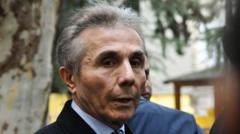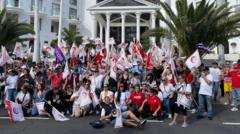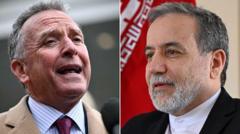As Georgia's wealthiest individual faces U.S. sanctions, scrutiny mounts regarding his financial maneuvers and the implications for the country's political landscape. The recent changes in tax regulations raise questions about corruption, while protests against government practices suggest ongoing unrest.
Georgia's Billionaire Under Scrutiny Amid Sanctions and Political Turmoil

Georgia's Billionaire Under Scrutiny Amid Sanctions and Political Turmoil
Ongoing sanctions against Bidzina Ivanishvili highlight concerns over political influence and economic stability in Georgia.
In recent developments, Bidzina Ivanishvili, Georgia's wealthiest and influential figure, is reportedly diverting funds to sidestep U.S. sanctions aimed at freezing his assets. The billionaire, who has deep ties to Georgian politics — having founded the ruling Georgian Dream party — is facing mounting pressure following widespread protests in spring 2023. The protests were sparked by increasing suspicions of Russian interference in Georgian governance and culminated in the controversial passage of the "foreign agents law." This legislation compels non-governmental organizations and media receiving significant foreign funding to register as foreign representatives, a move seen as an attempt to limit Western influence in the region.
In response to growing public outcry, Transparency International Georgia (TI) accused the government of enacting recent tax code revisions — allowing tax-free asset transfers from offshore accounts — primarily for Ivanishvili's benefit. With a hefty net worth of approximately $4.9 billion accrued from lucrative ventures in Russia during the 1990s, Ivanishvili's wealth largely resides within offshore entities. Observers assert that the new laws were strategically timed amidst his ongoing financial and legal struggles, particularly with the impending threat of sanctions from the United States and potential pressure from the UK government.
The opposition’s growing agitation prompted the U.S. government to levy sanctions against Ivanishvili last December, which have sparked fears of broader ramifications for Georgia’s economy, including a 40% drop in foreign direct investment compared to previous years. Amid this alarm, the Georgian government, led by Prime Minister Irakli Kobakhidze, touts an optimistic view of economic recovery, including a recent $6 billion investment from UAE’s Emaar Properties – characterized as the nation's biggest foreign investment in decades.
However, economic analysts remain skeptical, pointing to the political volatility and the negative perception of halted EU accession talks as significant factors dampening Georgia's fiscal outlook. A report by the Policy and Management Consulting Group (PMCG) warned of extremely negative economic prospects while advocating for fresh elections as a pathway to stabilizing the country's economy.
As the political tension escalates, Ivanishvili’s strategies within this critical juncture remain closely monitored, as they not only affect his fortune but also the broader implications for Georgia's democratic integrity and international relations.
In response to growing public outcry, Transparency International Georgia (TI) accused the government of enacting recent tax code revisions — allowing tax-free asset transfers from offshore accounts — primarily for Ivanishvili's benefit. With a hefty net worth of approximately $4.9 billion accrued from lucrative ventures in Russia during the 1990s, Ivanishvili's wealth largely resides within offshore entities. Observers assert that the new laws were strategically timed amidst his ongoing financial and legal struggles, particularly with the impending threat of sanctions from the United States and potential pressure from the UK government.
The opposition’s growing agitation prompted the U.S. government to levy sanctions against Ivanishvili last December, which have sparked fears of broader ramifications for Georgia’s economy, including a 40% drop in foreign direct investment compared to previous years. Amid this alarm, the Georgian government, led by Prime Minister Irakli Kobakhidze, touts an optimistic view of economic recovery, including a recent $6 billion investment from UAE’s Emaar Properties – characterized as the nation's biggest foreign investment in decades.
However, economic analysts remain skeptical, pointing to the political volatility and the negative perception of halted EU accession talks as significant factors dampening Georgia's fiscal outlook. A report by the Policy and Management Consulting Group (PMCG) warned of extremely negative economic prospects while advocating for fresh elections as a pathway to stabilizing the country's economy.
As the political tension escalates, Ivanishvili’s strategies within this critical juncture remain closely monitored, as they not only affect his fortune but also the broader implications for Georgia's democratic integrity and international relations.



















